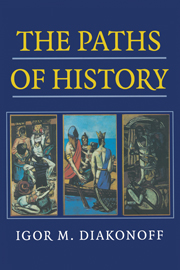Book contents
- Frontmatter
- Contents
- Foreword by Geoffrey Hoskins
- Preface
- Introduction
- 1 First Phase (Primitive)
- 2 Second Phase (Primitive Communal)
- 3 Third Phase (Early Antiquity)
- 4 Fourth Phase (Imperial Antiquity)
- 5 Fifth Phase (the Middle Ages)
- 6 Sixth Phase (the Stable Absolutist Post-Medieval Phase)
- 7 Seventh Phase (Capitalist)
- 8 Eighth Phase (Post-Capitalist)
- Index
6 - Sixth Phase (the Stable Absolutist Post-Medieval Phase)
Published online by Cambridge University Press: 02 December 2009
- Frontmatter
- Contents
- Foreword by Geoffrey Hoskins
- Preface
- Introduction
- 1 First Phase (Primitive)
- 2 Second Phase (Primitive Communal)
- 3 Third Phase (Early Antiquity)
- 4 Fourth Phase (Imperial Antiquity)
- 5 Fifth Phase (the Middle Ages)
- 6 Sixth Phase (the Stable Absolutist Post-Medieval Phase)
- 7 Seventh Phase (Capitalist)
- 8 Eighth Phase (Post-Capitalist)
- Index
Summary
As soon as we pass to the Sixth Phase of the historical process, we encounter a terminological difficulty. There is no doubt that so-called ‘modern history’ (which in Europe lasted from the sixteenth century to the nineteenth) is a separate Phase of the historical process. However, the term ‘modern’ is, for several reasons, undesirable. Since a considerable part of humanity is already experiencing the Eighth Phase, how can we call the Sixth Phase ‘modern’? We certainly have to invent another term. Above, we regarded the societies traditionally termed ‘Primitive’ as belonging to the ‘Primitive’ and the ‘Primitive Communal’ Phases, and the societies traditionally treated as ‘Ancient’ we have subdivided into ‘Early Antiquity’ and ‘Imperial Antiquity’. In both cases we introduced to the names of the Phases with even numbers an additional defining feature, referring to the type of the societal organisation but not to the type of production itself, or, in Marxist terminology, not to the ‘basis’ but to the ‘superstructure’. Nevertheless, from the historical point of view, our classification was justifiable, because the system of societal organisation appears as a most important classificational feature.
I suppose that the same method may be applied to choosing terms for the Fifth and the Sixth Phases. We did not call the Fifth Phase ‘Early Medieval’ (in parallel with ‘Early Antiquity’) but simply ‘Medieval’. This corresponds to the European historiographic tradition according to which (at least as regards Europe) ‘Early Medieval’ means solely the period from the creation of the Germanic kingdoms to the end of the Crusades.
- Type
- Chapter
- Information
- The Paths of History , pp. 144 - 192Publisher: Cambridge University PressPrint publication year: 1999

